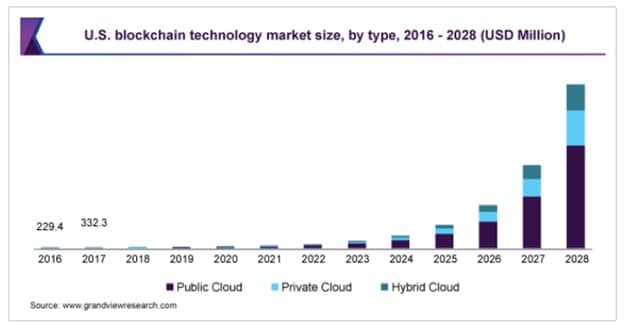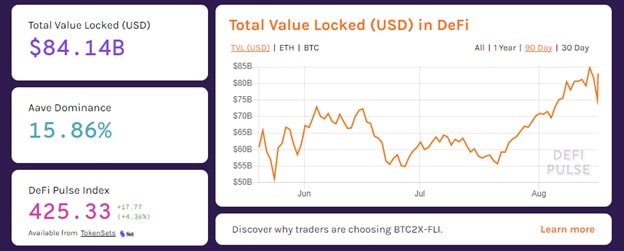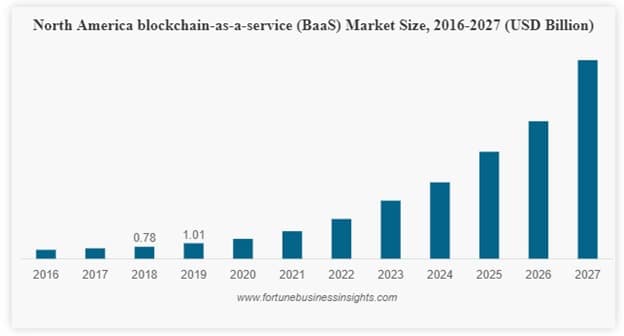A decade has already passed since the inception of the evolving blockchain technology. Blockchains are immutable records of data managed and operated by computers. Because of this elite feature, they provide much-needed data security.
The colossal surge and demand of blockchain technology help to drive digital transformation. Each industry niche is adopting blockchain to ensure safe and transparent business transactions.
Bitcoin and other cryptocurrencies are also gaining attention. It highly boosts the demand for blockchain technology.
The blockchain technology market size was estimated at USD 3.67b in 2020 worldwide. As per the prediction, it will grow 82.4% CAGR from 2021 to the end of 2028.

You might be interested to know about the blockchain trends in the year 2022. So, we have gathered some insights in this post. Have a look.
Table of Contents
#1. Permissioned Blockchain
Permissioned blockchains are a kind of extra security system provided by the blockchain. They maintain an access control layer. So particular actions can be performed only by authorized members. That is the reason it is different from the private and public blockchain.
A private key in the permission or private blockchain provides proficiency and trustworthiness. Authorized nodes can be accessible to only certain users.
Permissioned blockchains are not familiar to everyone such as other public blockchains. People who need safety, identification, and role definition, choose these blockchains.
#2. DeFi (Decentralized Finance)
DeFi is still in the beginning phase of its emergence. The TVL (Total Value Locked) in DeFi contracts is $84.14B as of August 2021.

In 2025, DeFi transactions are widely accepted compared to their centralized variants. Basically, due to the health crisis, aspiring investors are choosing transactions of DeFi to become inventors.
One of the best-known forms of DeFi that grab attention in 2025 is its lending platforms. DeFi transactions include purchasing coins and giving them for interest. These transactions are performed on decentralized exchange systems mounted with blockchain technology.
It is the best for investors and borrowers. The investor gains via interest, while the borrower effortlessly accesses loans for investment.
#3. Federated Blockchain
Federated blockchain or Consortium blockchain accept pre-selected participants. It is because this blockchain is not accessible to everyone (Semi-private).
Bitcoin enthusiasts believe that federated blockchain will be accepted widely in the year 2022. It provides rights to private blockchain to tailor its outlook. A consortium blockchain is almost similar to a private blockchain but consists of additional features.
- It works under different authorities rather than a single highly reliable node.
- All the network-connected organizations pre-select the authority nodes.
- Particular groups maintain the network and verify a block.
- The restricted inner area is accessible to the group only.
Hyperledger, Corda, and Quorum are examples of federated blockchain.
When you want to deal with confidentiality, safety, and control, federated blockchain would be the best option. It changes the way enterprises function. Well, that is something we need to see in the future.
#4. BaaS (Blockchain as a Service)
BaaS is a model based on SaaS (Software as a Service) that functions similarly. BaaS is a third-party cloud-based framework. It manages organizations that are developing and operating blockchain apps.
These third-party services are new progress in the rising field of blockchain.
Blockchain technology is no longer limited to cryptocurrency exchanges only. It extends to deal with different types of transactions securely. So the demand for hosting services has also enhanced.
BaaS works like a kind of web host. It runs the back-end operations for a blockchain-based app. BaaS may be the inspiration that leads towards an extensive acceptance of blockchain.
BaaS offers an external service provider. It can set up all the required blockchain technology and base for free. Once established, the provider keeps managing complicated back-end activities for the customer.
BaaS enables all types of companies to access blockchain technology. For that, they do not need to invest in in-house development.

The BaaS manager usually provides support operations like,
- Bandwidth handling
- Proper distribution of resources
- Hosting demands
- Data security features
#5. Hybrid Blockchain
These blockchains are a mixture of private and public blockchain. So they also combine the benefits of both. Enterprises that do not want to deploy a private or public blockchain and want to leverage both to avail combined benefits will use Hybrid blockchain.
Hybrid blockchain networks enable specific records to go public. On the other hand, keep the rest of the records confidential in a private network.
Even though the integration of public blockchain, they still work in a private ecosystem to ensure security.
When it comes to setting up costs, hybrid blockchain costs less. You can quickly and easily validate transactions because of its powerful nodes.
It is expected that emerging cryptocurrencies will accept the hybrid blockchain in 2022.
- Operates in a closed ecosystem without making everything public
- Get protection to 51% of attacks
- Provides privacy
- Provides improved scalability
- Enable rules to be modified as per the requirements
#6. Social Network
Blockchain-based digital networks can actually be the bright future of social media. The majority of people are worried about the data they have uploaded on social media. With decentralized social networks, users have more control and autonomy.
- Enhance the chances of social commerce
- Reduce frauds of advertisements
- Improved data security
- The platforms will be censor-free
- Less scalability
More and more social networks built using blockchain technology are anticipated to boost in the near future. A decentralized network will solve the issue of,
- Data management
- Privacy breaches
- Content relevancy
- Disgraceful scandals
With decentralized networks, illegal user data usage can be avoided. Blockchain technology leverages cryptography to safeguard the interaction between users. That ultimately results in data security and privacy.
Without any central authority, data usage is controlled by the users. They will get the freedom of what to publish and what not. Content moderation and sharing will be more efficient than ever before.
#7. NFT (Non-Fungible Tokens)
NFTs have been all-encompassing in the digital space in the past few months. It is a fusion of crypto, VR, and a healthy dose of social media fever.
NFTs are the virtual version of real-world assets (i.e., painting, games, sports cards, music albums, etc.). Anyone can sell their concepts online as an NFT.
These assets are sold and purchased using crypto only. They are encoded with similar software and streamlines the transaction procedure.
According to enthusiasts, NFTs are considered a significant aspect in the near future. It helps individuals to control their asset’s ownership. A single person can own the original and use blockchain entry for backup.
Artists can monetize the virtual version of their artwork. They even get royalty if it is traded or changed after the first sale.
NFTs have a unique identity code. Similar to the thumb impression, two NFTs are not identical. So production and transmission of fraud NFTs are pretty complex. One can not exchange it directly like cryptos. On purchasing an NFT, people get certificates secured with blockchain technology.
#8. VC and SSI (Verifiable Credential and Self Sovereign Identity)
SSI is a new perspective associated with the way identity gets controlled in the digital space. Users can make and manage their own identities without depending on any centralized authority.
SSI combines physical and e-authentication for secure, private, and efficient identity authentication. Users do not have to remember their keys or lengthy passwords. Instead, they leverage an app for that purpose.
The app stores your private keys and a soft copy of your physical document. Everything is encrypted and automatically saved similarly to any other app.
SSI has introduced the concept of VC (Verifiable Credential). It is now an approved W3C standard to exchange data with genuine proof. It is supported by public-key cryptography. It also performs with zero-knowledge proof that is highly complex privacy maintenance methods.
SSI provides valid, globally compliant, and confidentiality-retaining credentials. It can manage and store the security of the user’s device. Users can show it to anyone, anywhere. Industries where personal identification matters can use it such as bank accounts, insurance, health care, loan, claim benefits, etc.
#9. CBDC (Central Bank Digital Currency)
CBDC is a virtual form of central bank money. It is a legal tender built and supported by a central bank.
It depicts a claim against the central bank, not a commercial bank or any PSP(Payment Service Provider).
CBDC gets managed on a blockchain-based digital ledger. Thus, boost the payment security between banks, organizations, and persons. Ethereum is the best production-ready blockchain to utilize. It supports CBDC demands when it comes to scalability and privacy.
Central banks manage the currency with blockchain-based CBDC. It safeguards the confidentiality and independence of the CBDC use to the end-users.
CBDC rules are strongly coded in the protocol to assist compliance. For example, wallet limits or third-party accessibility to the system.
Blockchain assures availability and flexibility of data with transparency about transaction records. Ethereum has proved its potential to support a very large network with more than 10k nodes and thousands of users.
A blockchain-based CBDC gains from the visionary products/services built on the open-source blockchain system. It includes non-custodial wallets to have sole control of private keys, zero-knowledge cryptography without using a password or revealing any data, and DeFi.
Ethereum is the biggest blockchain system globally and has more than 350,000 developers.
#10. Finance and Blockchain
Nowadays, trade finance is an expensive and time-taking process. Banking entities and shipping fleets testing blockchain to build smart contracts among different parties. It can be one of the fascinating areas to see.
It is also interesting to look at what blockchain can provide to clearance, settlement, and other daunting operations. It is anticipated to offer more attention to security and tracking.
Central banks worldwide leveraging blockchain when it comes to payment processes; Because it offers high security and increased speed with minimal costs.
Blockchain’s peer-to-peer system for transactions is disrupting the old school methods to transfer funds globally.
Smart contracts also keep you away from human errors that occur during manual form fill-ups. Banking entities are always keen to use this kind of system because of the lower risk while transferring funds in real-time.
The banking sector is also trying to set up a shared ledger utilized to store customer identities securely.
It will be easy for Syndicated banks to mitigate the complexity and efforts needed to address local taxation and governing rules.
Summing up
Blockchain technology is disrupting the digital world and offers tremendous welfare to each industry niche. Even after confronting some difficulty in the past years, blockchain remains a desirable technology. It is expanding its potential towards new professions.
We could actually go on and on in listing blockchain trends as its use cases are growing consistently. Nowadays, ideas like using blockchain for content streaming, NFTs, CDBC, digital identity, everything is becoming a reality.
It is the year 2022 and we can leverage blockchain technology,
- To secure personal/confidential detail
- Customized access
- Tokenize any assets
- Boost company performance
- Increase company revenue
Soon, we will probably stop talking about the blockchain as an emerging technology as it is becoming a standard.
However, at the present day, blockchain project implementation is still a complicated task. You need to connect with an experienced blockchain development company that has a strong portfolio of successful assignments.
Blockchain experts will aid in discovering each aspect of the advanced technology. So you can evaluate its pros and cons and get customized solutions as per your preferences.

About the author